Willy
Wonka and the Chocolate Factory
1971
Director: Mel Stuart
Starring: Gene Wilder, Jack Albertson,
Peter Ostrum
Who
didn’t love this movie as a kid? Filled
with chocolate and candy and the most bizarre factory ever committed to film,
it’s a child’s dream. The opening credit
sequence, with shot after shot of ooey gooey chocolate, is enough to make my
mouth water just from the thought.
However, unlike most movies that you love as a kid, this one manages to
stand up to the transition to adulthood.
Charlie
Bucket (Ostrum) is very poor. When the
fantastic and reclusive candy maker Willy Wonka (Wilder, in perhaps his most
iconic role) announces a contest to win admittance to his factory and free
chocolate for life, Charlie is elated, and after being initially disappointed,
finds one of the five elusive Golden Tickets.
He and his Grandpa Joe (Albertson) encounter a myriad of wondrous and
terrible things in Wonka’s strange factory, but ultimately, Charlie proves he
is a good child, pure of heart, and wins Wonka’s final prize.
Based
on the famous children’s novel by Roald Dahl, Dahl also penned the screenplay
for this, the first adaptation of his work.
Dahl’s novels, favorites of mine when I was young (really, who DIDN’T love
his work?), are all bizarrely supernatural stories, where everyday children
somehow become involved in extraordinary events. What sets his stories apart from all the
other children’s novels about the supernatural, though, is Dahl’s supremely
honed sense of the sinister. Dahl’s
works don’t shirk from fear, realizing instead that it is important children
encounter safe manifestations of their fears in order to learn to deal with
them. I was fascinated by Dahl’s work
for that very reason. He wrote the best
villains. The Witches is
indelibly inked in my mind, despite the fact that I haven’t read the work for
two decades, because of its completely terrifying and thus effective villains.
I
mention all of this to make a point about Willy Wonka. It’s a children’s movie that transcends most
other children’s movies because of the fear, the threats, the sinister nature
of the film. Wait, isn’t it about
candy? Well, yes, but it’s more than
that. Willy Wonka focuses on a fantasy
world that happens to be built around candy.
Unlike most children’s films’ fantasy worlds, this is a world where the
rules are not only capricious but possibly vicious. There is evil and danger lurking even in the
most beautiful, candy-colored room, which, in turn, creates an atmosphere of
unease. There is great delight in the
film - I don’t want to paint this as an evil movie – but the delight is heavily
counterbalanced by a palpable sense of danger.
The psychedelic and dangerous boat ride is proof enough of that, let
alone the fact that Charlie is initially approached outside Wonka’s factory by
a man with a cart full of knives!
The
danger, the unease, the viciousness are all embodied and channeled through the
film’s main character, Willy Wonka. In
this role, Wilder fully inhabits his character in the most unnerving of
ways. It’s telling how strong of a
performance it is when you consider that Wonka himself does not appear until
nearly halfway through the film. He is
absent at first, but then his presence is so conspicuous, so all-consuming,
that you leave the film thinking he was in absolutely every scene. Wilder’s Wonka is an evil genius, an insane
criminal mastermind, but one who cloaks his crimes under the pretense of
selecting morally good people over morally bad people. When a criminal selects for the good and
against the bad, we don’t consider him a criminal, but when selecting against
bad people involves plunging them down pipes, sending them off to a gigantic
juicer, or pushing them through to an incinerator that may or may not be fired
up that day, he’s still a criminal. Wilder’s
Wonka is wily, slippery, and profoundly temperamental. He is singing one moment, and yelling the
next. He has next to no patience for his
guests, and is supremely unconcerned about any negative consequences of their
actions. How odd that he is the star,
then. He is far more a puppet master
than a hero; but, after all, that is what makes this movie so interesting. A dark, mischievious Puck-like figure at the
helm of an entire world is wonderful, thrilling, and frightening, all at the
same time.
Undoubtedly,
Wonka is the central figure of the film, but as mentioned earlier, he does not
make his first appearance until about 45 minutes in. The first portion of the film, often
overlooked in favor of the bizarre candy factory segment, deals with the
world’s search for Wonka’s Golden Tickets.
This section of the film is undeserving of its relegation as “second
best” half, as it’s uproariously funny. A
series of absolutely delightful vignettes about the fervor of the search paint
a portrait of a world absolutely obsessed with Wonka and his candy. A rich woman’s husband has been kidnapped,
and the ransom demand is a box of Wonka chocolates; she must think about it. A computer expert designs a program to tell
where the Golden Tickets are, only to have the program tell him he is
cheating. A psychiatrist is disdainful
of his client until the client says he dreamed the location of a Golden
Ticket. All these whimsical
mini-stories, completely unrelated to the overall characters’ stories, serve as
charming build-up to the entrance to the factory.
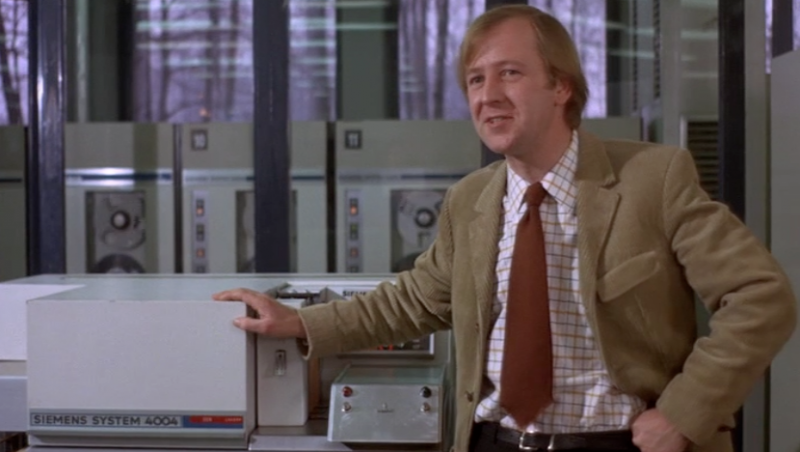 |
| I am now telling the computer EXACTLY what it can do with a lifetime's supply of chocolate... |
The
songs in the film are almost all ear-worms of the worst kind, guaranteed to be
stuck in your head all evening long.
“Who can make the sunshine?” you’ll hum, imagining Bill the candy
merchant in his wonderful little corner candy shop. Or maybe you’ll joyously sing along with
Grandpa Joe when he exclaims, “I’ve got a Golden Ticket!” Then there’s the Oompa-Loompas, the charming
yet also slightly fiendish workers at Wonka’s factory that serve as the Greek
Chorus of the film, singing “Oompa, Loompa, Doompity Doo.” Or best of all, sing along with Wilder as he
belts out, “If you want to view paradise / Simply look around and view it!” in
the beautiful “Pure Imagination.”
Infinitely singable, and very fun.
The
sets are pure whimsy. Wonka’s factory
was constructed entirely on backlots, lending a superficiality to it which
works. There isn’t meant to be anything
natural about Wonka’s factory, so it’s fitting that it all looks fake. The colors are bright and bold, and there are
oddities around every corner. The
lickable wallpaper (“The snozzberries taste like snozzberries!”), the
seizure-inducing room full of angles and dizzying walls, and the shrinking room
are only shown for a few moments, but they’re more than memorable. And, it’s worth mentioning, this was all
achieved without reliance on CGI special effects.
Last
November, the Dryden showed Willy Wonka and the Chocolate Factory;
that, in and of itself, is not so unique.
What was special was the fact that Peter Ostrum, aka Charlie Bucket,
attended the screening and spoke about his experience making the movie in
Munich. Ostrum is currently a large
animal veterinarian living and working in upstate New York; Willy
Wonka was the only film he ever made.
He struck me as a very humble man, and at the conclusion of the evening
said, “I was only in one film, but what a film it is!” He was very appreciative of everyone who
helped him on the set of the film, but also never regretted the decision to
leave acting.
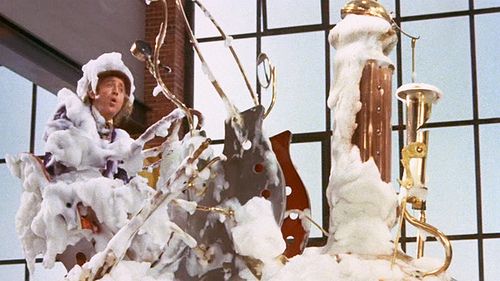 |
| Ostrum told us the white goop in this scene was flame retardant foam from fire extinguishers. |
The
crowd that night at the Dryden was one of the largest I’ve seen in the six or
seven years I’ve been going there.
People were pumped to see this movie; much more than for typical movies. The excitement in the air was palpable. The audience actually applauded when the film
started – unusual, even for the Dryden.
Everyone watching the movie was SO into it, SO happy, SO excited, that
the entire audience broke out in spontaneous cheering and whooping when Charlie
found the golden ticket. It’s an easy
bet to make that the majority of audience members had seen the film before, and
therefore knew what would happen, but everyone – myself included – was so much
more excited about Charlie finding his golden ticket! It was a magical movie moment, just a part of
an evening that ranks high in my “Top Movie Theater Experiences” list.
I
loved this movie as a child, and I love it as an adult, and not purely for
sentimental reasons. It holds its own as
a legitimate film, full of whimsy and menace, musical merriment and threatening
danger. Children can handle danger if
adults let them, and more often than not, they’re better for it. After seeing all the horrible things that
happen to the horrid, obnoxious little children in this film, I know I was more
inspired as a child to be good like Charlie Bucket, because maybe, just maybe,
I’d get to see Willy Wonka’s Chocolate Factory!
Arbitrary
Rating: 10/10
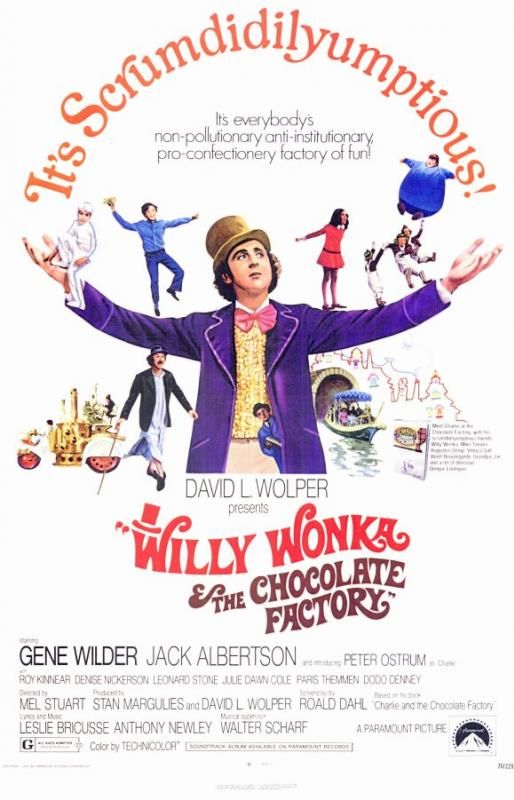
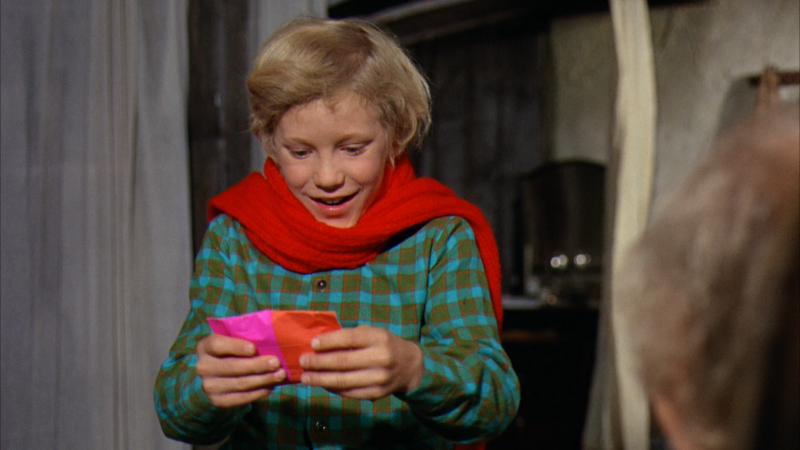
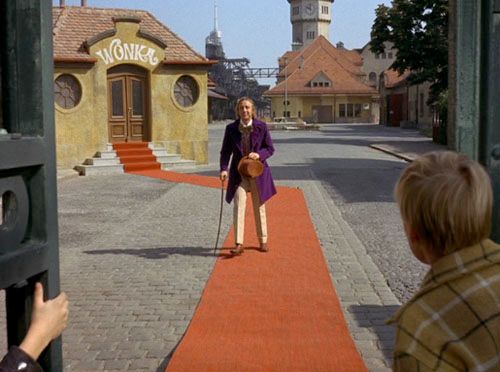
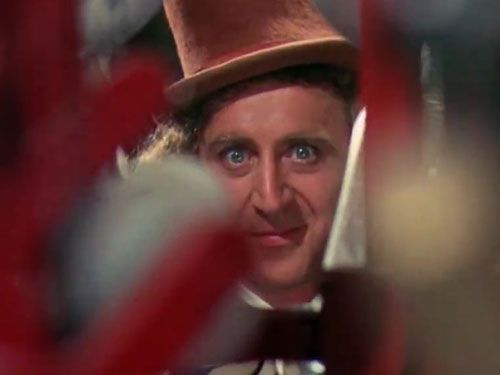
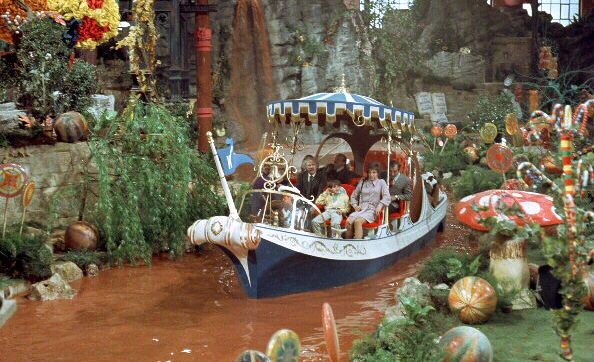
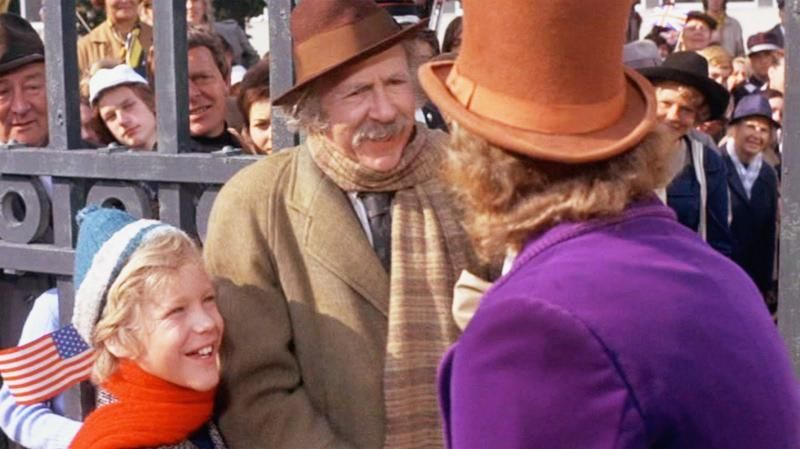
I can't argue with any of this.
ReplyDelete"Pure Imagination" might be the single greatest song/song performance in a film I have ever encountered, and that's saying a lot. It's also Gene Wilder's best, and that's saying a damn lot.
I also love just how damn quotable this film is.
"Pure Imagination" is the musical embodiment of the spirit of this film. It's fun but also a bit threatening and dissonant. "Candyman" may have been the big chart-topping hit to come from the film, but "Pure Imagination" is the better song.
DeleteThis and Young Frankenstein are my two favorite Gene Wilder films, but Wilder, as an actor, is better here. He just has to be funny in Young Frankenstein, but here, he has a much more interesting job.
"I want an oompa-loompa nooooooooooooooooooow!"
You were very lucky to have been able to attend an event with Ostrum there to talk about the film. I've read that he makes very few appearances in relation to it and when he does they are usually ones geared towards children.
ReplyDeleteIf you have the DVD you have to listen to the commentary track by the five "children" (then all in their 40s). It's hilarious in places, especially when the two women get going. It may be the most entertaining commentary track I've listened to.
Yes, I definitely got the impression at the Dryden that this was not a normal thing for him. I think it helped that he works in upstate NY, and where I live/where the Dryden is located is western upstate NY, but upstate NY nonetheless. His whole family was there too, getting a tour of the George Eastman House (that's the museum the Dryden is a part of) beforehand. I think he said it was the first time one of his children was attending a screening of this film.
DeleteI'll definitely have to check out that commentary track, thanks! Wow, most entertaining? Impressive!
Just a further note on the commentary:
DeleteI've literally listened to several hundred commentary tracks. The best ones are by the actors, if there is more than one of them so they can get going trading stories; the worst ones are by the writers because they spend the entire time complaining about what was changed from their script. Producers tend to be second worst - they mostly talk about how hard it was for them to find locations. Directors can be hit or miss - some point out the little things they put on screen that you might have missed, while others just talk about the weather they had to deal with on every single shot.
Almost all commentaries are done "stream of consciousness" style with no preparation whatsoever. Warwick Davis' commentary for Willow is a big exception - he was thoroughly prepared and had obviously watched the film at least one again just beforehand in order to organize and sync up his thoughts. If you like Willow then I definitely recommend you listen to that, too.
Of those several hundred I've listened to there are two that I always recommend to people when the film they were done for is brought up: Roger Ebert's commentary for Citizen Kane and the actors' commentary for Willy Wonka. The former is because of how prepared he was and how informative it is. The latter is because of the sheer fun they are having (although I felt a little bad for the German guy - "Augustus Gloop" - who just got overwhelmed by how fast the others were talking, probably because English was not his primary language.)